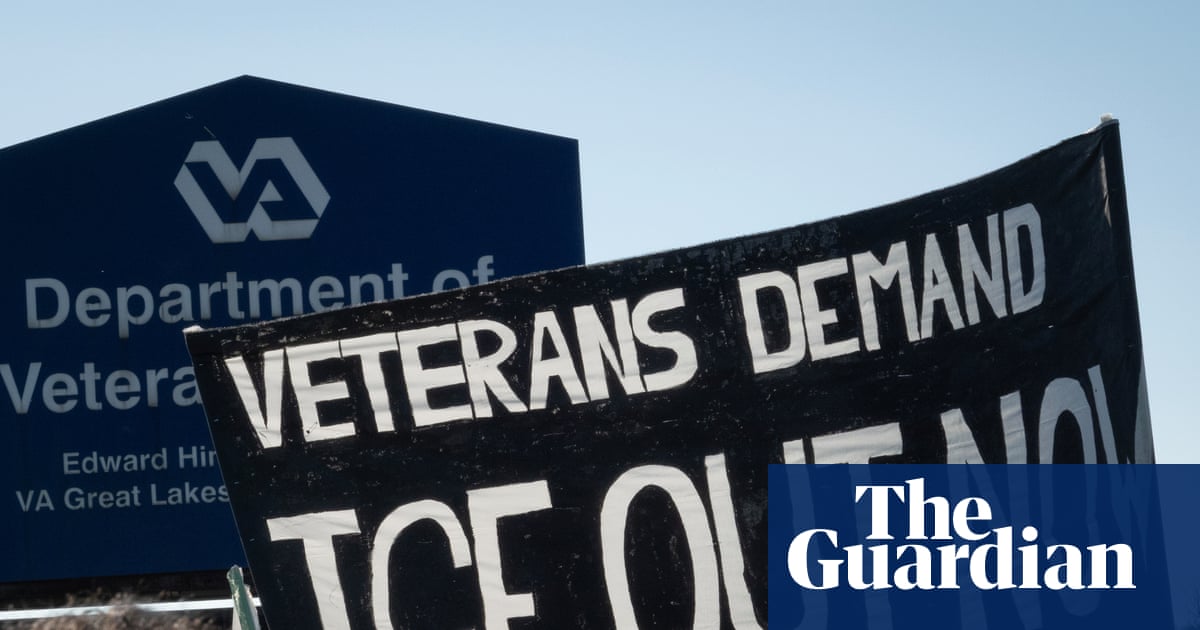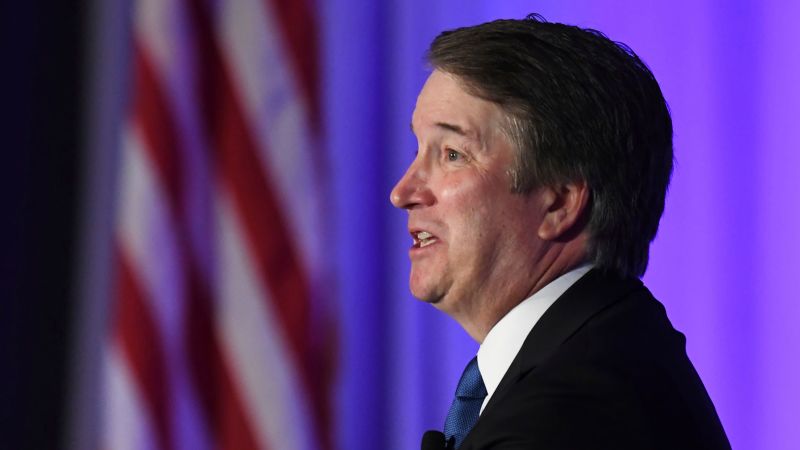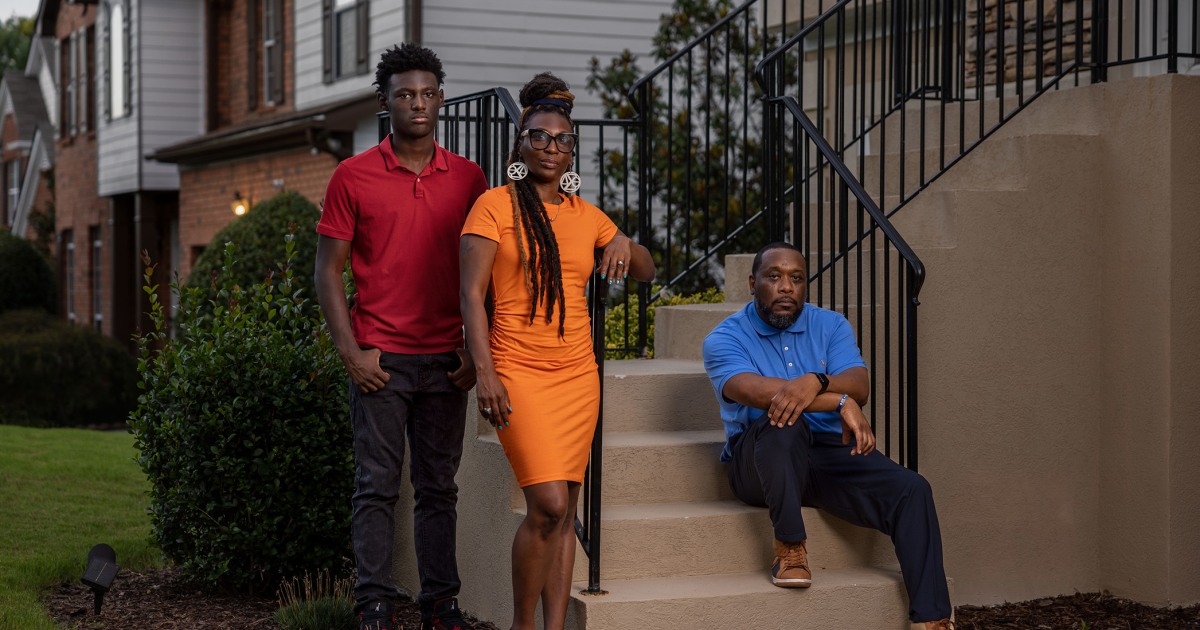Veterans are facing federal charges after protesting Ice sweeps and Trump’s national guard deployments. The justice department claims the veterans were violent
US military veterans increasingly face arrest and injury amid protests over Donald Trump’s deportation campaign and his push to deploy national guard members to an ever-widening number of American cities.
The Guardian has identified eight instances where military veterans have been prosecuted or sought damages after being detained by federal agents.
The latest incident occurred in Broadview, outside Chicago, where 70-year old air force veteran Dana Briggs was charged with felony assault on a federal officer on 29 September.
A widely shared video on social media shows a masked US Immigration and Customs Enforcement (Ice) agent advance on and knock over the elderly veteran during a protest outside an Ice detention center.
Federal prosecutors claim Briggs committed assault when he “made physical contact with an agent’s arm while the agent attempted to extend the safety perimeter”.
Briggs pleaded not guilty and was released on an appearance bond.
Jose Vasquez, a former US army staff sergeant and executive director of the progressive veterans’ organization Common Defense, which counts Briggs as a member, said veterans like Briggs “have stood up at Ice protests and faced arrest because we recognize a pattern of state-sanctioned abuse”.
Another veteran, John Cerrone, was arrested while protesting outside the Broadview Ice detention the day before Briggs. A social media video shows a group of masked agents tackle the 35-year-old marine corps veteran, who served as a combat infantryman in Afghanistan, as teargas floats in the air.
Cerrone says he was held for nine hours at the Broadview facility, alone in a cell with walls covered by blood, hair and mucus. He says that while he was behind bars he was visited by an Ice agent who boasted that he had shot Cerrone in the head with rubber bullets and exclaimed: “Where is that pussy!”
“Their conduct was completely unprofessional in my experience in combat infantry,” Cerrone said. “Even in Afghanistan, we had very clear rules of engagement. The conduct of these agents was such that if it occurred in Afghanistan, they would be removed from the front line. They would be court-martialed.”
Cerrone was released after receiving a citation for “exhibiting disorderly conduct on federal property”, a misdemeanor under federal law, which he plans to contest.
White House spokesperson Abigail Jackson told the Guardian: “Anyone who assaults or otherwise harms law enforcement officers will be held accountable to the fullest extent of the law.” Jackson added that “Ice officers are facing an 1,000% increase in assaults because of unhinged rhetoric from activists and Democrat politicians smearing heroic Ice officers.”
Jackson and a Department of Homeland Security (DHS) spokesperson did not provide data to back up the claim about a 1,000% increase.
In a brief reply to questions from the Guardian, a Department of Justice spokesperson said: “Under this Administration, we follow the law and have a one-tier system of justice, and this Department of Justice will relentlessly uphold the rule of law to protect our nation.”
“What drives so many veterans into action is not only the injustice faced by immigrants and protesters, but also the larger threat to democracy rooted in government brutality and militarization,” Vasquez, the Common Defense leader, said. “The disturbing escalation in arrests and violence signals that the basic freedoms we once swore to protect are under attack.”
Not all of the veterans discussed in this story indicated their military service at the time of the incidents or their arrests.
On Thursday, the US district judge Sara Ellis issued a temporary restraining order restricting federal agents from “using riot control weapons” against journalists, protesters and religious practitioners in Chicago unless there is probable cause that the individuals have committed a crime.
In a statement in the wake of Briggs’s arrest, Demi Palecek – an Illinois army national guard member who is running as a Democrat for a state legislative seat in Chicago – criticized Ice agents for their lack of training.
“As a military member, I can tell you – the way they handle weapons is reckless and dangerous,” she said. “I’ve seen Ice agents with their fingers on the trigger of real M16s, pointing M9s directly at people. Trigger-happy. No trigger discipline… with this level of escalation and incompetence, people will die.”
An DHS spokesperson countered that “Ice and other federal law enforcement are using proper force with professional training to protect the public as well as federal buildings from violent Antifa-aligned terrorists.” Those arrested assaulted Ice officers, the spokesperson said.
Veterans have also protested Ice’s use of a Chicago area VA hospital’s parking lot as a staging ground for immigration raids.
Senator Tammy Duckworth – a former US army helicopter pilot who lost the use of both legs when she was shot down over Iraq – offered her support to demonstrators on 17 September, demanding that secretary of veterans affairs, Doug Collins, evict agents from the Edward Hines Jr VA Hospital.
“It adds injury to insult when VA surrenders resources in support of reckless, paramilitary activities that do nothing to enhance Veteran care – and even worse, are actively harming Veterans and US servicemembers by rounding up these patriotic Americans, along with their family members, and deporting them with little or no due process out of the country they were willing to risk their lives to defend,” she wrote.
“We have veterans who are staying away and not getting healthcare or coming in carrying their passports,” said Aaron Hughes, an Iraq war veteran and former Illinois national guardsman, who is a member of the anti-war veterans group, About Face, which organized the protest.
Nicholas Podjasek, a 34 year-old US air force veteran born in Honduras, told the Guardian he cancelled a primary care appointment at the Hines VA which had been scheduled for Thursday.
Though Podjasek, like nearly all veterans is a US citizen, he said many are nonetheless worried about being detained by Ice “because we are brown”, citing a Trump administration policy that legalized racial profiling in immigration enforcement.
“These people are masking themselves and they zip tie children,” he said. “They’ve broken into people’s homes and apartments. They could easily detain me on public transportation on the way to the VA or right outside the gate.”
In an email to the Guardian, VA press secretary Peter Kasperowicz denied such fear exists. Kasperowicz said the VA was “proud to support its federal partners in the fight against illegal immigration” and that there “has been no impact on veteran care or facility access” from Ice agents’ use of the Hines VA parking lot.
In Portland, Oregon, US marine corps veteran Daryn Herzberg II, who served in Afghanistan, is seeking $150,000 in damages after he was hospitalized after being tackled from behind by Ice agents while protesting outside a federal facility in Portland on 13 August.
A video posted on social media shows an agent grabbing Herzberg by the hair and slamming his face into the ground multiple times while saying, “You’re not talking shit anymore are you?” according to a Federal Tort Claims Act complaint filed by his attorney.
A DHS spokesperson countered that the former marine corps sergeant, who was honorably discharged in 2012, “is well known for acts of violence outside the Ice facility in Portland, including throwing rocks and other objects at the building and personnel.” The spokesperson also said Herzberg has “used fake blood to falsify injuries” and “perpetuated and encouraged violence” against Ice.
Herzberg has not been charged with a crime. His attorney, Michael Fuller, denied the spokesperson’s assertions and said “the Ice assault video speaks for itself.”
“The fact that DHS won’t attribute its slander of a US marine to an actual witness speaks to the baseless nature of its allegations,” the attorney said.
As previously reported by the Guardian, Afghanistan war veteran Bajun Mavalwalla II faces federal conspiracy charges after participating in a 11 June protest that sought to block the transport of two Venezuelan migrants who were in the country legally seeking asylum when they were detained by Ice.
In Washington DC, attorney general Pam Bondi announced on 14 August that she was charging Afghanistan war veteran Sean Charles Dunn with felony assault after he allegedly threw a sandwich at a Customs and Border Patrol agent. However, prosecutors were unable to secure an indictment from a grand jury.
Other notable veterans arrested, include:
Iraq war veteran and US citizen George Retes, 25, was arrested on 10 July by Ice during a raid on a cannabis farm in Ventura county, California where he worked as a security guard. He was held in federal custody for three days.
Retes is seeking damages under the Federal Tort Claims Act, alleging wrongful arrest. In an op-ed in the San Francisco Chronicle, he wrote: “If it can happen to me, it can happen to any one of us.” In a social media post on X, the Department of Homeland Security alleged he was arrested for assault. As of this writing, no charges have been filed.
A DHS spokesperson told the Guardian that the justice department was reviewing the case, “along with dozens of others, for potential charges related to the execution of the federal search warrant in Camarillo”.
On 25 August, 20-year army combat veteran Jay Carey – who served in Iraq, Bosnia and Afghanistan – was arrested and faces two federal misdemeanor charges after burning a flag in front of the White House. Carey, from western North Carolina, was part of a small group of veterans who came to Washington to protest the national guard’s deployment to that city.
On 13 June , an 87-year-old disabled veteran in a walker was arrested after he traveled from an assisted living facility in Florida to protest Donald Trump’s military parade. John Spitzberg, whose service spanned the army, air force and air national guard, was among dozens of veterans arrested for protesting what they said was the politicization of the armed forces and Trump’s authoritarian instincts. Spitzberg is a member of Veterans for Peace.

https://www.theguardian.com/us-news/2025/oct/13/us-veterans-protest-ice-raids


